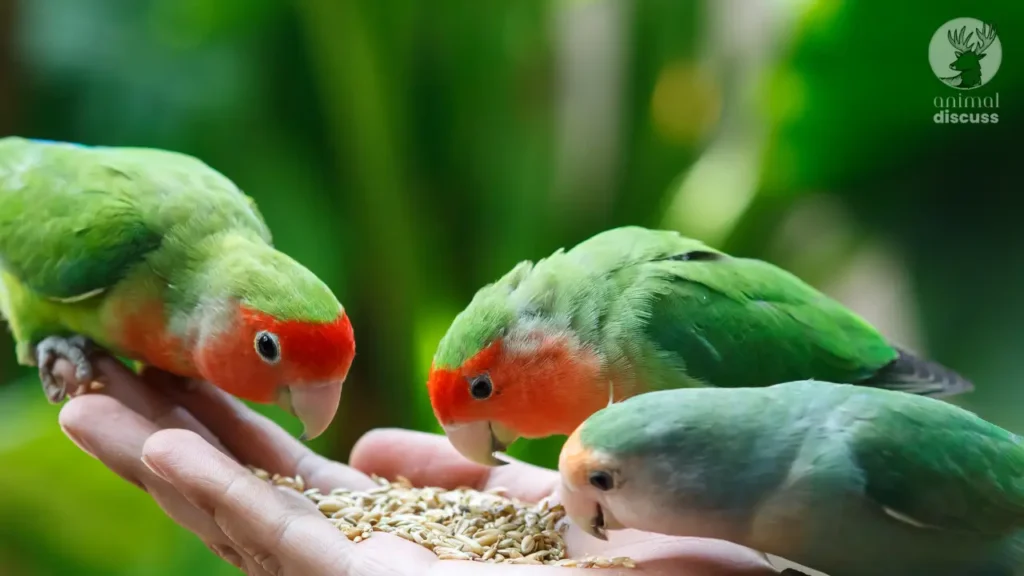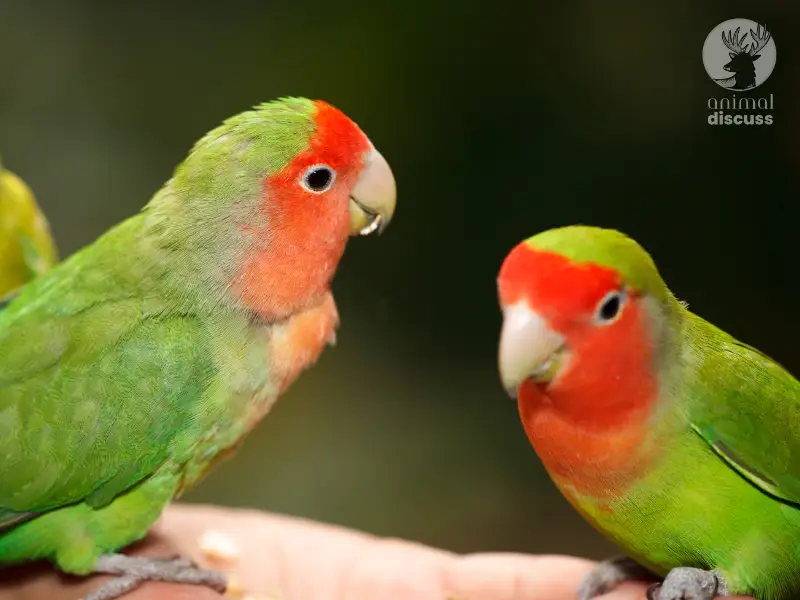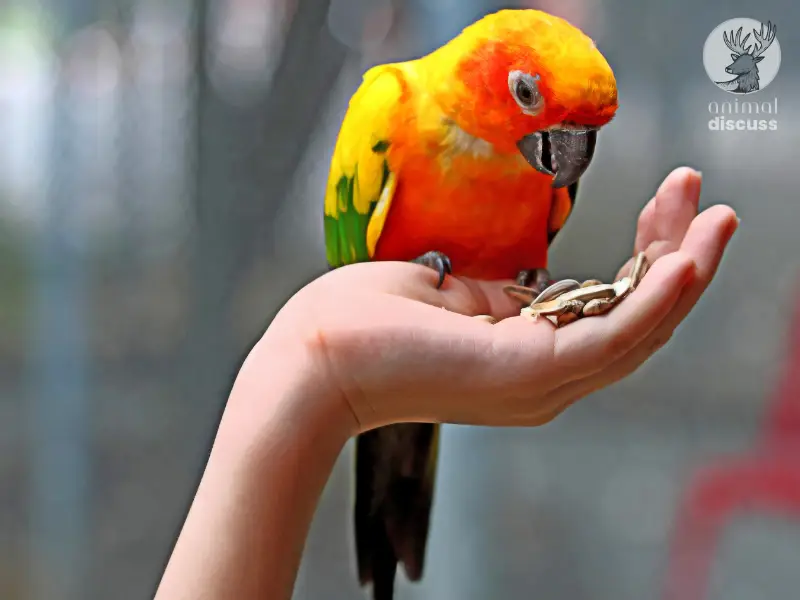This is your ultimate guide to lovebird foods and diet. Whether you’re a new owner or a seasoned bird enthusiast, feeding your lovebird the right diet is key to their health and happiness.

In this comprehensive guide, we’ll dive into the foods that should be part of their daily meals, explore supplements, and offer tips to keep them thriving.
In this guide, you’ll learn how to:
- Choose the best foods for your lovebird
- Build a balanced diet plan
- Safely introduce treats and new foods
- Identify foods to avoid for your bird’s health
- Understand water and supplement requirements
So, let’s dive in and ensure your lovebird gets the nutrition they need to live a long, healthy life!
1. What Are the Best Foods for Lovebirds?
Lovebirds require a well-balanced diet to thrive, and providing them with the best foods is essential for their overall health.
In this section, we’ll discuss the ideal foods that should be a part of your lovebird’s daily intake. A balanced diet helps in boosting their immune system, improving feathers, and ensuring a long, healthy life.
Seeds: A Staple for Lovebird Diets
Seeds make up a significant part of a lovebird’s diet, but not all seeds are created equal. High-quality seeds like millet, sunflower seeds, and safflower seeds are excellent sources of essential fats and vitamins.
However, it’s important to avoid too many sunflower seeds as they can be high in fat, which can lead to obesity if overfed.
Pellets: The Nutrient-Rich Alternative
Pellets are specially formulated to provide all the nutrients your lovebird needs in a single serving. They are designed to meet their daily nutritional requirements, including vitamins, minerals, and proteins.
Pellets can be a better option than seeds alone, as they prevent selective eating, where the bird picks out only its favorite seeds.
Fresh Fruits and Vegetables
Lovebirds are fond of fresh fruits and vegetables, and these should be a staple in their diet. Apples, oranges, papaya, mangoes, and berries are excellent sources of vitamins and antioxidants.
Dark leafy greens like spinach, kale, and broccoli are also great for their digestive health.
2. How to Create a Balanced Diet Plan for Lovebirds?
Maintaining a balanced diet for lovebirds involves understanding their specific nutritional needs.
Birds need a combination of protein, fat, and carbohydrates to remain healthy. A well-rounded diet helps maintain their energy levels and overall wellness.
The Role of Protein, Fats, and Carbohydrates
Lovebirds require protein for muscle growth and repair, fats for energy, and carbohydrates for fuel.
Offering a mix of seeds, pellets, and fresh food ensures your lovebird gets all the macronutrients it needs.
Make sure to balance the protein from seeds and healthy fats from nuts or seeds, and limit carbohydrates to maintain a healthy weight.
Portion Control and Feeding Schedule
Overfeeding can lead to health issues like obesity or malnutrition.
Divide your lovebird’s daily food intake into two to three meals a day. Keep an eye on portion sizes to avoid waste and ensure that your bird isn’t overeating.
Offering fresh fruits and vegetables in small amounts ensures variety without overwhelming your bird’s digestive system.
Regular Monitoring and Adjustment
Your lovebird’s needs may change depending on its age, activity level, and health. Baby lovebirds require more frequent feedings, while older birds may need fewer meals.
Adjust your diet plan based on their changing requirements to maintain a balanced, healthy diet.
3. Can Lovebirds Eat Treats?
Yes! Lovebirds can enjoy a variety of treats, but they should be given in moderation. Treats are a great way to enrich your bird’s diet and provide an extra source of nutrients.

Safe Treats for Lovebirds
Healthy treats like unsweetened dried fruit, almonds, and small pieces of cooked vegetables can be given as a snack. Avoid sugary or processed snacks as they can lead to obesity or digestive problems.
Homemade Treat Recipes
You can make your own lovebird treats at home by combining seeds, dried fruits, and oats. Simply mix these ingredients and bake them into small bite-sized pieces.
Homemade treats allow you to control what your bird consumes and offer an affordable way to pamper them.
Moderation is Key
Even though treats are a fun way to bond with your lovebird, they should not be the main part of their diet. Treats should make up no more than 10-15% of their overall food intake to avoid an imbalance in their nutrition.
4. Are There Any Foods Lovebirds Should Avoid?
While many foods are safe for lovebirds, some are harmful and should be completely avoided. Feeding them the wrong foods can lead to serious health issues, including toxicity or digestive problems.
Toxic Foods for Lovebirds
Certain foods are toxic to lovebirds, including chocolate, avocado, caffeine, and alcohol. These can cause severe reactions like heart arrhythmias, vomiting, and even death in extreme cases. Always ensure that these foods are kept out of your bird’s reach.
Processed Foods and Junk Foods
Avoid feeding lovebirds highly processed or junk foods, such as salty chips, sugary cereals, and fast food.
These foods contain unhealthy fats, sugars, and additives that can lead to health issues like obesity, heart disease, and nutrient imbalances.
High-Salt Foods
Too much salt can lead to kidney damage in lovebirds. Avoid feeding your bird salty foods like crackers, chips, or anything with excessive sodium.
5. What Supplements Should Be Included in a Lovebird’s Diet?
While a varied diet should meet most of your lovebird’s nutritional needs, certain supplements can help support their overall health, particularly if their diet is lacking in specific areas.
Calcium Supplements
Calcium is crucial for bone health and egg production in female lovebirds. Offering a calcium block or adding crushed eggshells to their food can help ensure they get enough calcium.
This is especially important for female lovebirds.
Vitamin Supplements
Vitamin A is vital for your bird’s vision and immune system.
Supplementing your lovebird’s diet with vitamin A-rich foods like carrots or offering a multivitamin supplement ensures they receive all the nutrients needed for optimal health.
Mineral Supplements
Minerals like magnesium and zinc help maintain muscle function and immune system health. Mineral blocks are a good way to provide these essential nutrients.
6. How to Encourage a Lovebird to Eat a Variety of Foods?
Lovebirds can be picky eaters at times, so it’s essential to introduce a variety of foods into their diet to ensure they receive all the necessary nutrients.
Gradual Introduction of New Foods
If your lovebird isn’t used to a certain food, try offering it in small amounts alongside their favorite foods. Gradually increase the quantity over time until they get accustomed to the new taste and texture.
Positive Reinforcement
Reward your lovebird with a small treat when they try new foods. This reinforces positive behavior and encourages them to be more adventurous with their eating habits.
Monitor and Adjust
If your lovebird refuses a certain food, don’t give up.
Sometimes, it takes several attempts before they accept a new food. Keep offering healthy options without forcing them.
7. How Often Should Lovebirds Be Fed?
Lovebirds, like most birds, thrive on a regular feeding schedule. Establishing a consistent routine helps your bird maintain a balanced diet and keeps their metabolism stable.

Feeding Frequency for Adult Lovebirds
Adult lovebirds typically require two meals a day, though the exact amount depends on their activity level and age.
Make sure to provide fresh food each morning and replace it with new food in the evening.
Adjusting for Baby and Elderly Lovebirds
Baby lovebirds need more frequent meals and will benefit from four meals a day. As lovebirds age, they may require fewer feedings, so adjust accordingly to avoid overfeeding.
Monitoring Hunger and Fullness Cues
Keep an eye on your lovebird’s eating habits. If they consistently finish their meals, they may need a bit more food. If they leave food uneaten, consider reducing portion sizes.
8. What is the Role of Water in a Lovebird’s Diet?
Water plays a vital role in a lovebird’s overall health, as it helps with digestion, hydration, and nutrient absorption.
Water Requirements for Lovebirds
Lovebirds should always have access to fresh, clean water.
They typically drink about 1-2 teaspoons of water per day, but this can vary based on their activity level and environmental conditions.
Importance of Clean Water
Dirty or contaminated water can lead to bacterial infections, so change their water at least once a day.
Avoid using water bottles with metal spouts, as they can harbor bacteria.
Offering Water in a Safe Container
Ensure your lovebird’s water container is easy to access and safe to drink from. A shallow bowl works best to prevent drowning, but make sure it’s heavy enough not to tip over.
Final Words
Feeding your lovebird a well-balanced diet is essential for their long-term health and happiness. With the right mix of seeds, pellets, fresh fruits, and vegetables, your lovebird will have the energy and nutrients to thrive.
Remember, moderation is key when offering treats, and always keep toxic foods out of reach. Regularly adjust their diet as they grow and develop to meet their changing needs.
By following these tips, you’ll be providing your lovebird with the best chance for a healthy, happy life.

